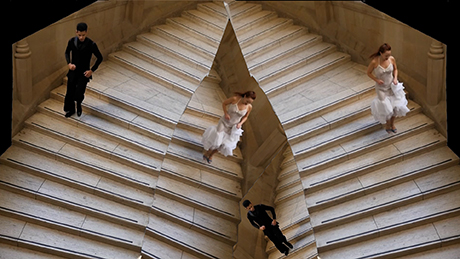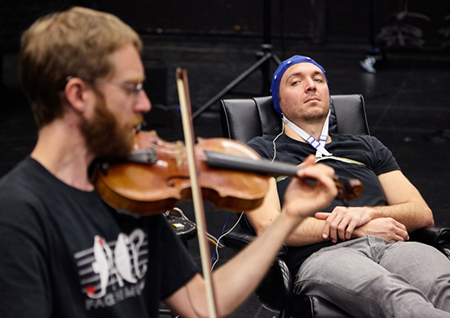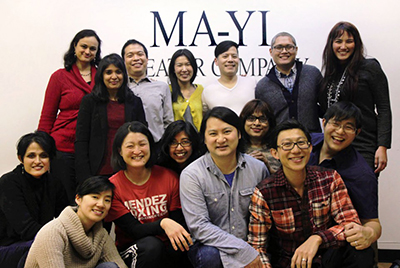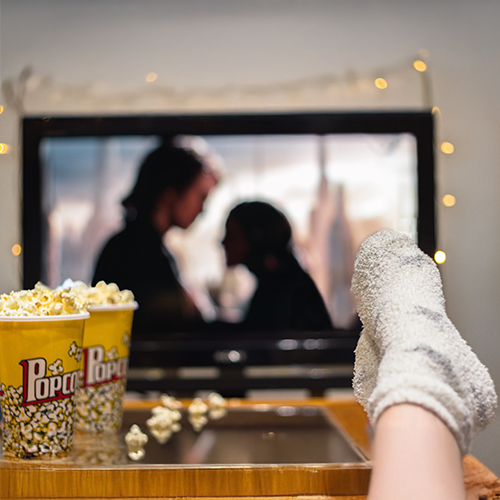Argentinian choreographer Margarita Bali has spent months thinking about Seattle’s stairs. The elegant stairs in UW’s Suzzallo Library. The bold central staircase in Odegaard Undergraduate Library. The concrete steps in downtown Seattle’s Freeway Park. As a visiting artist at the UW through mid-April, Bali is collaborating with students, faculty, alumni, and community dancers on a work that features stairs as a way to explore physical movement in diverse settings.
Bali is one of more than a dozen artists from around the world immersed in creative research at the UW through the Creative Fellowships Initiative, a program funded through a three-year, $750,000 grant from the Andrew W. Mellon Foundation. The initiative is spearheaded by the UW’s Meany Center for the Performing Arts.

“This initiative focuses on process, not product,” says Michelle Witt, executive and artistic director of Meany Center, who co-leads the initiative with Todd London, executive director of the School of Drama. “If the byproduct of a fellow’s process is a new work, that’s fabulous, but they are not required to develop any kind of final product. That makes this very different than other types of grant support.”
All the UW performing arts units are involved in this initiative. Since spring 2016, they have welcomed a diverse group of fellows, from playwrights to composers to performance artists to choreographers, with visits ranging from ten days to several months or longer. Fellows sometimes teach workshops, discuss their creative process in public forums, and collaborate with faculty and students during their visits — but only if they choose to. Their approaches to the fellowship are as varied as their creative work.
The JACK Quartet, a string quartet committed to contemporary music, is midway through its residency, with six campus visits scheduled over three years. Drawn to the UW by the innovative work being done by DXARTS and School of Music faculty in the area of experimental music, the quartet is collaborating with Professors Richard Karpen and Juan Pampin to create and perform music that incorporates live electronics manipulated by brainwaves and arm motions. The collaboration involves experimentation, collection of data, and the design of an interactive electronic musical instrument, all using cutting-edge technology developed at the UW.

“Experimental work involves quite a bit of trial and error,” says JACK Quartet’s John Richards. “This residency provides the time and space necessary to fully develop these ideas into dependable and usable musical devices that artists can use in the live performance.” The residency will culminate with a concert-length work for string quartet and electronics in 2019, with the audience engulfed in sounds controlled by the live actions and brainwaves of the quartet on stage.
Dustin Chinn, a playwright with Ma-Yi Theater Writers Lab, spent his month-long residency hanging out with a non-arts crowd. He traveled to the UW’s Friday Harbor Lab in the San Juan Islands, where he met with marine scientists to gather information for a play he’s writing about Herschel, a nickname given to the sea lions who became famous for preying on Washington’s endangered steelhead trout.
“The process gave me a much-needed historical and scientific perspective on the events the play is based upon,” says Chinn. “It also gave me firsthand contact with scientists, and a notion of how they talk, think, and how they might want to be represented in a fictional context.” Chinn presented a reading of his play-in-progress during a public event at the School of Drama.
Artists have so much to teach us about innovation and creativity.
For choreographer Bali, the opportunity to immerse herself in creative work for three months, away from her home in Argentina, has been a huge plus. “I’ve been able to give all my attention to the work,” she says. “Total focus. It’s an opportunity to do something unusual, and I’m thankful for that.” Bali is creating a videodance—a dance choreographed to be filmed rather than performed on stage—that will feature faculty, students, and community dancers on stairs that curve, lead nowhere, or overlap with a mind-bending nod to artist M.C. Escher. She also is teaching a UW course on technology and dance, which has attracted students from physics, math, and drama as well as dance.
The public can attend a work-in-progress presentation of Bali’s videodance on April 3, followed by a discussion with the artist. Also this spring, Mellon fellows Nguyễn Thanh Thủy and Ngô Trà My from Vietnam, Stefan Östersjö from Sweden, and Garth Knox from France join long-time artistic partner Karpen in the performance of two new musical works collaboratively created for the one-of-a-kind Harry Partch instrument collection at the School of Music. Previous initiative projects have included a new piece by dance company BANDALOOP, performed at Meany Center in October 2017. “It was the world premiere, and the piece will now have an international life,” says Witt. “The residency allowed BANDALOOP to break into a completely new type of work.”

Not all fellows present their work or lead workshops, but they all inspire students through their presence and their creative process. “They all work in different ways, and they model for students the ambition, imagination, and artistic freedom that are part of research in the arts,” says London. “The Creative Fellowships Initiative is trying to create a semblance of a research laboratory by giving the fellows space and time and some resources in a way that only a large research university can.”
And this is only the beginning, adds Witt. “We’re hoping to continue to build and grow this initiative,” she says. “Artists have so much to teach us about innovation and creativity.”
. . .
Margarita Bali's work-in-progress presentation is scheduled for 7 pm on April 3 at the Northwest Film Forum. Visit the event webpage for information or to RSVP.
Two new musical works created collaboratively by fellows Nguyễn Thanh Thủy, Ngô Trà My, Stefan Östersjö, and Garth Knox, and UW Professor Richard Karpen, will be performed on May 11 at 7:30 pm in Meany Theater during the School of Music's Harry Partch Festival. Visit ArtsUW for information or tickets.
More Stories

Bringing Music to Life Through Audio Engineering
UW School of Music alum Andrea Roberts, an audio engineer, has worked with recording artists in a wide range of genres — including Beyoncé.

A Healing Heart Returns
In February, the UW Symphony will perform a symphony that Coast Salish elder Vi Hilbert commissioned years ago to heal the world after the heartbreak of 9/11. The symphony was first performed by the Seattle Symphony in 2006.

Need a break from holiday movies? Try these
For those wanting a break from holiday movies, Cinema & Media Studies faculty and grad students offer suggestions.